| Listing 1 - 10 of 25 | << page >> |
Sort by
|
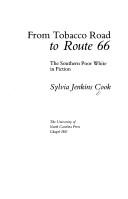
ISBN: 0807812641 Year: 1976 Publisher: Chapel Hill University of North Carolina press
Abstract | Keywords | Export | Availability | Bookmark
 Loading...
Loading...Choose an application
- Reference Manager
- EndNote
- RefWorks (Direct export to RefWorks)
American fiction --- Working class whites in literature. --- Poor in literature. --- History and criticism. --- Southern States --- In literature. --- Poor in literature --- Working class whites in literature --- History and criticism

ISBN: 9788484442462 8484442462 Year: 2001 Publisher: Granada: Comares,
Abstract | Keywords | Export | Availability | Bookmark
 Loading...
Loading...Choose an application
- Reference Manager
- EndNote
- RefWorks (Direct export to RefWorks)
Spanish fiction --- Poor in literature --- Social classes in literature --- Picaresque literature, Spanish --- Antiheroes in literature
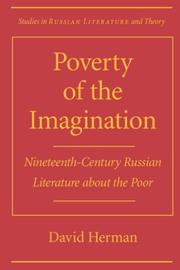
ISBN: 0810116928 0810121301 Year: 2001 Publisher: Evanston, Illinois : Northwestern University Press,
Abstract | Keywords | Export | Availability | Bookmark
 Loading...
Loading...Choose an application
- Reference Manager
- EndNote
- RefWorks (Direct export to RefWorks)
The primal scene of all nineteenth-century Western thought might well be the moment an observer gazed at someone poor, most commonly on the streets of a great metropolis, and wondered what the spectacle meant in human, moral, political, and metaphysical terms. In Russia, where so much of the population was impoverished, the moment held special significance. David Herman examines how Russian writers portrayed this poverty and what their portrayal reveals and articulates about core values of Russian culture.Focussing on specific texts but addressing the literary tradition as a whole, Herman begins with Karamzin's immensely popular story "Poor Liza", the first in a sequence of poverty narratives that self-consciously address one another. He then considers Pushkin's "Egyptian Nights"; Gogol's "Overcoat", Petersburg tales, and Selected Passages; and Dostoevsky's Idiot and 1880 "Pushkin speech".With a series of innovative readings, Poverty of the Imagination teases out a Russian discourse on lack which owes its peculiar richness to an insistence on solving simultaneously problems of social justice, national identity, and the ethics of the human imagination. As prominently as poverty figures in Russian literature, this is the first sustained analysis of its literary, conceptual, and cultural implications. As such, it deepens our understanding and appreciation of some of the most widely read literature of all time.
Russian literature --- Poor in literature. --- Poverty in literature. --- History and criticism.
Book
ISBN: 3110925907 Year: 2017 Publisher: Tübingen : Max Niemeyer Verlag,
Abstract | Keywords | Export | Availability | Bookmark
 Loading...
Loading...Choose an application
- Reference Manager
- EndNote
- RefWorks (Direct export to RefWorks)
Working class whites in literature. --- Naturalism in literature. --- Poor in literature. --- Law, John,
Book
ISBN: 3846744476 Year: 2008 Publisher: Paderborn : Wilhelm Fink Verlag,
Abstract | Keywords | Export | Availability | Bookmark
 Loading...
Loading...Choose an application
- Reference Manager
- EndNote
- RefWorks (Direct export to RefWorks)
Armut, ein globales und menschheitsgeschichtliches Phänomen, zählt zu den drängendsten Problemen der Gegenwart. Doch jenseits politischer Diskurse und medialer Skandalisierungen scheinen Not, Mangel und Ausgrenzung kaum ein ästhetisches Recht beanspruchen zu können. Die Gleichsetzung von ästhetischem und materiellem Vermögen wird indes bereits in der Antike kritisch reflektiert. Dass auch in der deutschsprachigen Literatur unschöne Armut und schöne Literatur nicht notwendig im Widerspruch zueinander stehen, belegen die Autorinnen und Autoren des Bandes. Die Beiträge rücken die produktive Spannung zwischen den materiellen Bedingungen und ihren ästhetischen Transformationen als vielgestaltige Ökonomien der Armut in den Blick. Nicht zuletzt stellt sich mit der Frage nach den sozialen Verhältnissen in der Literatur auch diejenige nach einem social turn in den Kulturwissenschaften.
Poverty in literature. --- Poor in literature. --- Social classes in literature. --- German literature --- History and criticism.
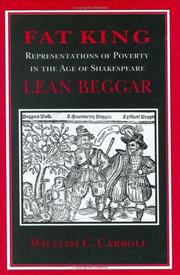
ISBN: 0801431859 Year: 1996 Publisher: Ithaca, N.Y. Cornell University Press
Abstract | Keywords | Export | Availability | Bookmark
 Loading...
Loading...Choose an application
- Reference Manager
- EndNote
- RefWorks (Direct export to RefWorks)
English literature --- Thematology --- History of civilization --- anno 1600-1699 --- anno 1500-1599 --- Beggars in literature. --- Literature and society --- Poor in literature. --- Poverty in literature. --- History
Book
ISBN: 3484450231 9783484450233 Year: 1984 Volume: 23 Publisher: Tübingen Niemeyer
Abstract | Keywords | Export | Availability | Bookmark
 Loading...
Loading...Choose an application
- Reference Manager
- EndNote
- RefWorks (Direct export to RefWorks)
Naturalism in literature --- Working class whites in literature --- Poor in literature --- Law, John, --- Law, John --- Law, John, - 1854-1923 - City girl
Book
ISBN: 2277210900 Year: 1980 Volume: 1090 Publisher: [Paris] : Editions J'ai lu,
Abstract | Keywords | Export | Availability | Bookmark
 Loading...
Loading...Choose an application
- Reference Manager
- EndNote
- RefWorks (Direct export to RefWorks)
French literature --- Poor in literature --- Literature and society --- Littérature française --- Pauvres dans la littérature --- Littérature et société --- France --- France --- Social conditions --- Conditions sociales
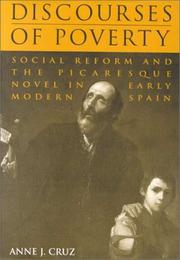
ISBN: 0802044395 9786612037061 1282037064 1442673958 9780802044396 Year: 1999 Volume: *76 Publisher: Toronto, [Ontario] ; Buffalo, [New York] ; London, [England] : University of Toronto Press,
Abstract | Keywords | Export | Availability | Bookmark
 Loading...
Loading...Choose an application
- Reference Manager
- EndNote
- RefWorks (Direct export to RefWorks)
In this ground-breaking study, Anne Cruz examines the treatment of poverty, prostitution, war, and other social concerns in the cultural and literary discourses of early modern Spain. This book investigates the polemics on poor relief through religious charity and secularized reform articulated not only in the Spanish picaresque canon - Lazarillo de Tormes, Guzm¯n de Alfarache, El busc3/4n - but also in female picaresque narratives and soldiers' tales. Emphasizing Bakhtin's notion that discursive practices must be assessed as they intersect and become textualized in history, the book also looks at this literature in relation to normative writings such as royal decrees, regulations, economic proposals, synods, and sermons. Through these discourses, authors and authorities alike debated their theories of poor assistance for both men and women, from the critique of unregulated prostitution in works such as La lozana andaluza to the control of impoverished youths through military conscription as in Alonso de Contreras and Estebanillo Gonz¯lez. The rupture of the feudal system and the economic devastation of the country precipitated a dramatic rise in the number of poor, who were increasingly perceived as delinquents by an anxious populace. The book employs Foucault's paradigms of confinement and control to study the various suggestions for the social containment of Spain's marginalized elements. Positing that the literary p¦caros and p¦caras assume the role of scapegoats for this disenfranchised social Other, Cruz further argues that the picaresque novels respond dialectically to the growing demonization of the poor in early modern Spanish culture.
Armoede in de literatuur --- Pauvreté dans la littérature --- Poverty in literature --- Picaresque literature, Spanish --- Spanish fiction --- Poor in literature --- Social problems in literature --- History and criticism --- Picaresque literature [Spanish ] --- Classical period, 1500-1700 --- Poverty in literature. --- Poor in literature. --- Social problems in literature. --- History and criticism.
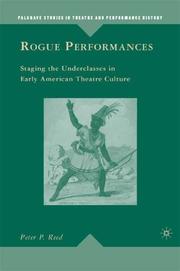
ISBN: 9780230622715 0230622712 9780230607927 0230607926 9781349374663 1349374660 Year: 2009 Publisher: New York, NY : Palgrave Macmillan,
Abstract | Keywords | Export | Availability | Bookmark
 Loading...
Loading...Choose an application
- Reference Manager
- EndNote
- RefWorks (Direct export to RefWorks)
Rogue Performances recovers eighteenth and nineteenth-century American culture's fascination with outcast and rebellious characters. Highwaymen, thieves, beggars, rioting mobs, rebellious slaves, and mutineers dominated the stage in the period's most popular plays. Peter Reed also explores ways these characters helped to popularize theatrical forms such as ballad opera, patriotic spectacle, blackface minstrelsy, and melodrama. Reed shows how both on and offstage, these paradoxically powerful, persistent, and troubling figures reveal the contradictions of class and the force of the disempowered in the American theatrical imagination. Through analysis of both well known and lesser known plays and extensive archival research, this book challenges scholars to re-think their assumptions about the role of class in antebellum American drama.
American drama
---
American drama
---
American drama.
---
Armut
| Listing 1 - 10 of 25 | << page >> |
Sort by
|

 Search
Search Feedback
Feedback About UniCat
About UniCat  Help
Help News
News